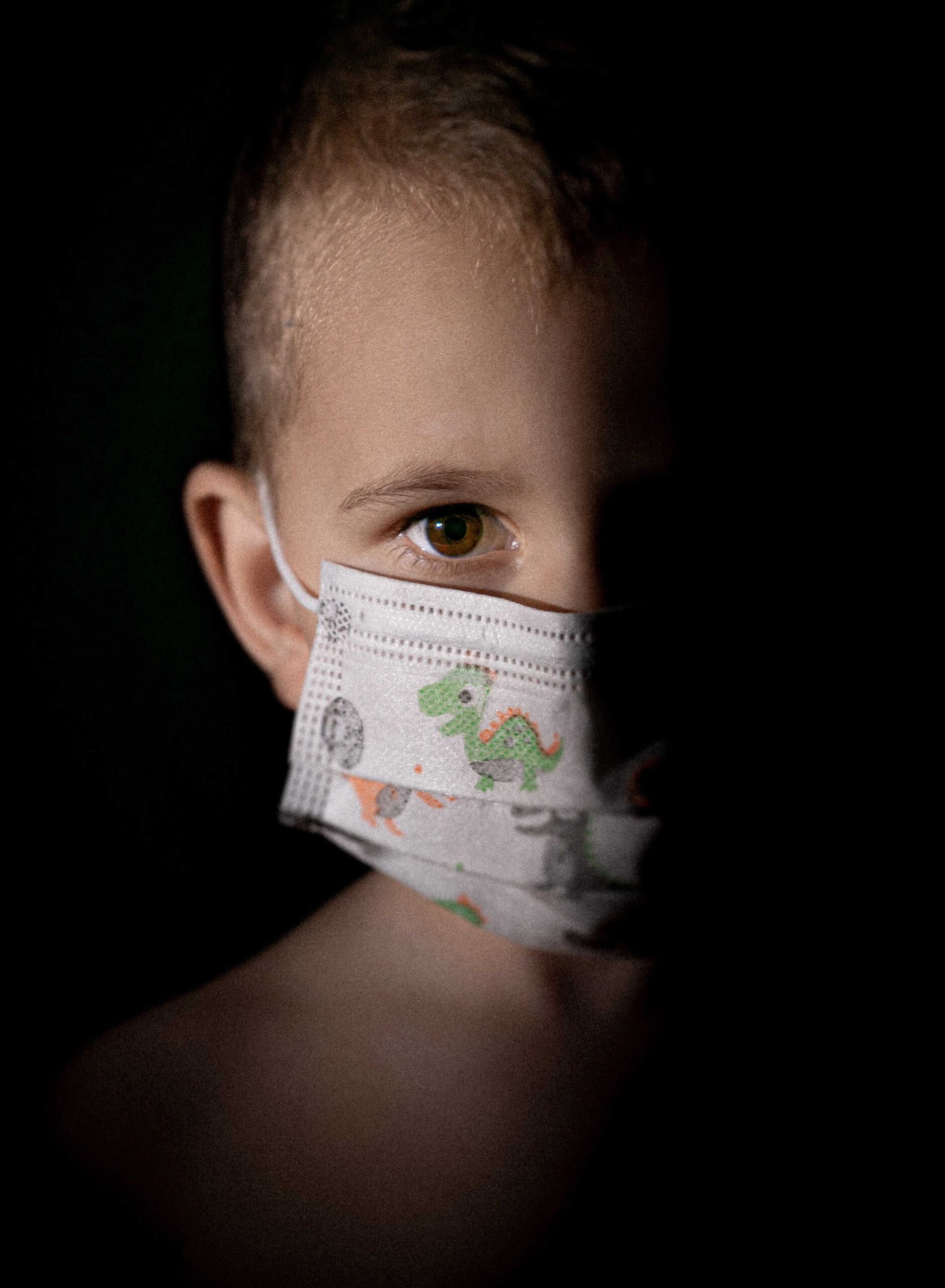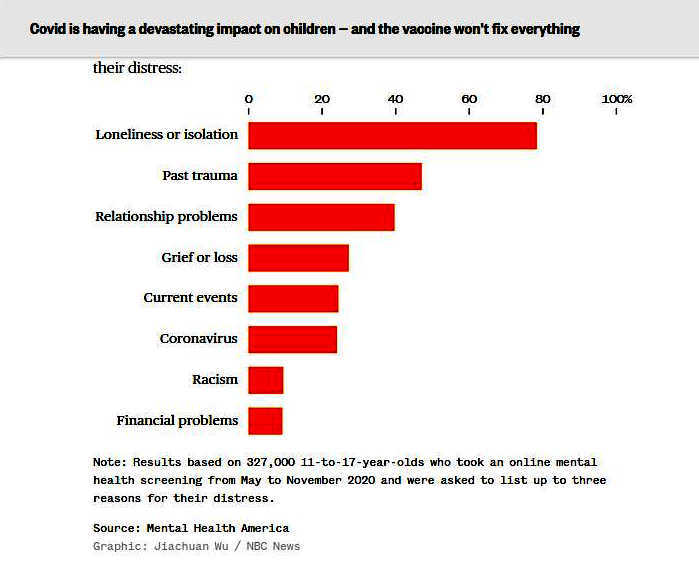
The current pandemic is having a profound effect on our children’s mental well being. Researchers all over the world are warning that, apart from the physical damage to children due to malnutrition (according to UNICEF in 2020 an additional 44 million children were facing severe nutritional deficiencies due to parents’ loss of income and employment, missing out on school lunches, etc.1), their emotional well being is also increasingly being challenged. According to the CDC in the US, the number of children seeking mental health care increased dramatically in 2020.2For children between 12 -17 this figure increased by 31% from 2019; for 5 – 11 years by 24%. Similar trends have been seen in the UK and elsewhere. The fear, anxiety, stress and disruption of routine have severely affected children and some speculate that they may experience consequences that will last many years into the future.
The graph below lists children’s challenges resulting from the pandemic:

There are a number of things parents can do to help offset the negative effects of the pandemic. As can be seen from the graph, the biggest problem is loneliness and isolation. Children are by nature intensely sociable, it’s how they develop the skills that enable them to function in society. Parents can help mitigate this by involving their children in day to day family affairs; by scheduling time to talk, play and watch positive, uplifting programmes and movies. The important thing is to talk to, and listen to, your kids daily. Another great idea is to organize regular video calls with family and friends which involve the kids.
If the weather permits, take them for walks, bike rides, play games outside – there are a number of studies that show that fresh air and sunshine play a very positive role in alleviating, or minimizing, depression and anxiety.
Parents need to maintain a positive attitude in the home. Only speak positively and always be encouraging about the future and your kids’ potential. Limit exposure to the media, it’s predominantly negative and sensationalist. Involve your children in activities that will bring the family closer together, like planning future holidays, events, etc. Pray for and with your children.
Check the foods you are giving your children. There is overwhelming evidence that diet plays a major role in mental health. Sugar aggravates depression! It is not only in obvious things like sweets, chocolates and fizzy drinks, but is also in every processed, packaged food. It has very little nutrient value and depletes the body’s store of the B vitamins and chromium, both of which play a role in preventing and lessening depression.3,4 A Chinese study showed that in children who drank three fizzy drinks a day, compared to only one, suicidal tendencies were 80% more and attempted suicides increased by 350%! The authors concluded “There is a positive association between consumption of soft drinks and sweet food and risks for suicidal behaviours among adolescents in China.”5 A Belgian study showed that those with the highest intake of sugar and confectionery products had significantly higher odds of rates of anxiety and depression.6 The researchers noted that “Those with the highest consumption of fruit (incl. nuts, seeds and olives) and vegetables had significantly lower odds of presenting a high psychological distress.”
Junk foods, (takeaways, processed and packaged foods and convenience meals) also play a huge role in depression and anxiety. A 2014 study of 13 486 children has the following to say “Junk food consumption may increase the risk for psychiatric distress and violent behaviours in children and adolescents.”7
There is no doubt that a healthy diet high in fruits, vegetables and unrefined carbohydrates, will help prevent, or at least lessen, mental health problems in children. It ensures they start life healthy and may help prevent the onset of chronic diseases, like heart disease, cancer, diabetes and mental decline. In addition, it makes sense to give children nutritional supplements to bridge the gaps between what they are getting from their food and what they actually need. Look for supplements that are organic, made from whole food and are proven to be bioavailable.
The following nutrients are important.
A good multivitamin and mineral
Vitamins and minerals are foundational to a child’s proper development. Make sure the supplement is formulated to contain all the vitamins and minerals needed by growing children (especially zinc, iron and ALL the B vitamins) and doesn’t contain colourants, sweeteners or preservatives.
Zinc is needed in over 1000 enzyme activities and is essential for normal growth and development in children. A deficiency of zinc has been linked to increased feelings of anxiety and depression, as well as decreased growth, learning disabilities, poor attention span, impaired memory and increased colds, flu and infections.
Iron deficiency is the most common deficiency in children and has been linked to anxiety, social problems and learning and behavioural difficulties.
Omega 3
Omega 3 fatty acids are essential for brain, eye and nerve development in children and have been shown to play a role in improving concentration and mood.8 The best Omega 3 supplements contain all 8 omega factors (most contain only two!), are health screened to ensure they contain no contaminants (lead, mercury, pesticide residues, etc.) and are guaranteed to be pure and not rancid.
Protein Shake
Protein is made up of building blocks called amino acids. Every cell in the body contains amino acids, as do enzymes and hormones. Growing children need good quality protein to be able to meet the demands of their fast growing bodies. Traditional protein sources like meat, cheese, etc., contain cholesterol, omega 6 which is inflammatory, and are often contaminated with growth hormones and antibiotic residues. Choose a protein shake that contains all the 22 amino acids needed by the human body, that is guaranteed free of any preservatives, additives, etc. and helps to stabilize blood sugar levels (remembering how sugar affects mood) . A delicious protein shake may be the answer for picky eaters.
There is no doubt that children are being negatively affected by the current pandemic.
Parents can make a massive difference by following the above guidelines and especially by ensuring that their children have a good healthy diet. A little planning can make all the difference and may save children years of anxiety, depression and health problems in the future.
References
- https://data.unicef.org/covid-19-and-children/
- https://www.cdc.gov/mmwr/volumes/69/wr/mm6945a3.htm
- https://pubmed.ncbi.nlm.nih.gov/12559660/
- https://pubmed.ncbi.nlm.nih.gov/27384573/
- https://pubmed.ncbi.nlm.nih.gov/21627691/
- https://academic.oup.com/eurpub/article/27/suppl_3/ckx187.231/4556200
- https://pubmed.ncbi.nlm.nih.gov/25280418/
- https://www.ncbi.nlm.nih.gov/pmc/articles/PMC5603098/